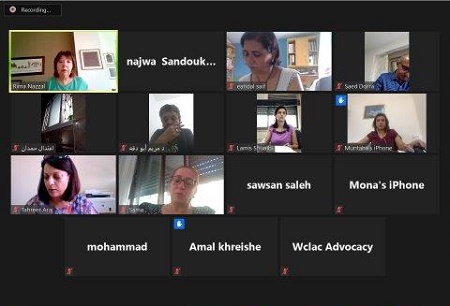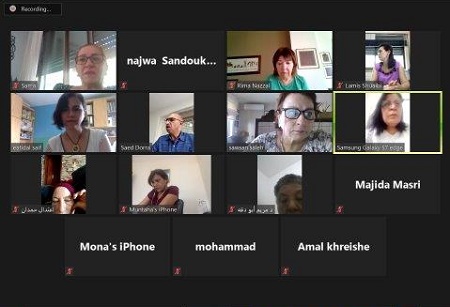|
MIFTAH discusses preliminary results of a needs-assessment and priorities survey for Palestinian women within the framework of UNSCR1325
Ramallah – 28/7/2020 – On July 28, MIFTAH held a zoom meeting to discuss the preliminary data and results from its survey on the needs and priorities of Palestinian women and girls in relation to the UNSCR 1325 components of participation, protection, accountability, prevention and human security. The report included Palestinian women in all locations: the West Bank (including Jerusalem), the Gaza Strip, Jordan and Lebanon while the meeting brought together member institutions of the National Coalition for Implementing UNSCR 1325 Secretariat in addition to the various branches of the General Union of Palestinian Women (GUPW) in the homeland and Lebanon. The session stressed on the various contexts in which Palestinian women and girls live in the areas targeted by the survey, highlighting the specificity of their issues from a gender perspective. The report shed light on the hierarchal and power relations women endure due to the policies of the Israeli occupation, which are a main factor affecting on the social, economic and cultural conditions of the Palestinian people under occupation as a whole. They specifically have grave repercussions on women and girls given the patriarchal culture that has created a complex and complicated reality for them, resulting in women’s awareness on the necessity to find mechanisms to respond to these needs.
 The coalition’s member institutions, which operate under the umbrella of GUWP, confirmed the qualitative results of the survey, which showed the discrepancies between age, geographic location and social class to which Palestinian women and girls belong. The members maintained that the methodology for data collecting was able to amplify the voices of young women, which were absent from the first generation of the coalition’s advocacy and lobbying plan for UNSCR 1325 and remained within Palestinian women’s perspective and vision. The participants also confirmed the need to integrate all of the data within the report’s analytical framework and for the aforementioned data, with its discrepancies, to be included in every component of the resolution. They said it was imperative not to exclude or marginalize any voice, which will contribute to building a lobbying and advocacy plan that would enable the women’s coalition to hold the occupation to account and be able to confront the challenges facing women and girls in terms of deciding their own fate and making their own choices. This, they said, could be accomplished through active coordination with experts in Palestine and in areas of Palestinian refuge in exile. MIFTAH projects manager Najwa Yaghi-Sandouka said the session was part of the organization’s “Policy Dialogue and Good Governance” program that aims to provide spaces for dialogue which guarantee interaction at the national and international levels based on frameworks of international legitimacy. She also said it was part of MIFTAH’s interventions and efforts in promoting Palestinian women’s participation in peace and security building in addition to supporting the demand of the women’s movement for a real national, international and political will to hold relevant parties to account in providing protection for Palestinian women and integrating them in efforts aimed at achieving peace and security in the region.

http://www.miftah.org |